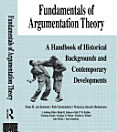Argumentation, Communication, and Fallacies: A Pragma-dialectical Perspective
ก.ค. 2016 · Routledge
eBook
252
หน้า
family_home
มีสิทธิ์
info
reportคะแนนและรีวิวไม่ได้รับการตรวจสอบยืนยัน ดูข้อมูลเพิ่มเติม
เกี่ยวกับ eBook เล่มนี้
This volume gives a theoretical account of the problem of analyzing and evaluating argumentative discourse. After placing argumentation in a communicative perspective, and then discussing the fallacies that occur when certain rules of communication are violated, the authors offer an alternative to both the linguistically-inspired descriptive and logically-inspired normative approaches to argumentation.
The authors characterize argumentation as a complex speech act in a critical discussion aimed at resolving a difference of opinion. The various stages of a critical discussion are outlined, and the communicative and interactional aspects of the speech acts performed in resolving a simple or complex dispute are discussed. After dealing with crucial aspects of analysis and linking the evaluation of argumentative discourse to the analysis, the authors identify the fallacies that can occur at various stages of discussion. Their general aim is to elucidate their own pragma- dialectical perspective on the analysis and evaluation of argumentative discourse, bringing together pragmatic insight concerning speech acts and dialectical insight concerning critical discussion.
The authors characterize argumentation as a complex speech act in a critical discussion aimed at resolving a difference of opinion. The various stages of a critical discussion are outlined, and the communicative and interactional aspects of the speech acts performed in resolving a simple or complex dispute are discussed. After dealing with crucial aspects of analysis and linking the evaluation of argumentative discourse to the analysis, the authors identify the fallacies that can occur at various stages of discussion. Their general aim is to elucidate their own pragma- dialectical perspective on the analysis and evaluation of argumentative discourse, bringing together pragmatic insight concerning speech acts and dialectical insight concerning critical discussion.
เกี่ยวกับผู้แต่ง
Frans H. van Eemeren, Rob Grootendorst
ให้คะแนน eBook นี้
แสดงความเห็นของคุณให้เรารับรู้
ข้อมูลในการอ่าน
สมาร์ทโฟนและแท็บเล็ต
ติดตั้งแอป Google Play Books สำหรับ Android และ iPad/iPhone แอปจะซิงค์โดยอัตโนมัติกับบัญชีของคุณ และช่วยให้คุณอ่านแบบออนไลน์หรือออฟไลน์ได้ทุกที่
แล็ปท็อปและคอมพิวเตอร์
คุณฟังหนังสือเสียงที่ซื้อจาก Google Play โดยใช้เว็บเบราว์เซอร์ในคอมพิวเตอร์ได้
eReader และอุปกรณ์อื่นๆ
หากต้องการอ่านบนอุปกรณ์ e-ink เช่น Kobo eReader คุณจะต้องดาวน์โหลดและโอนไฟล์ไปยังอุปกรณ์ของคุณ โปรดทำตามวิธีการอย่างละเอียดในศูนย์ช่วยเหลือเพื่อโอนไฟล์ไปยัง eReader ที่รองรับ






